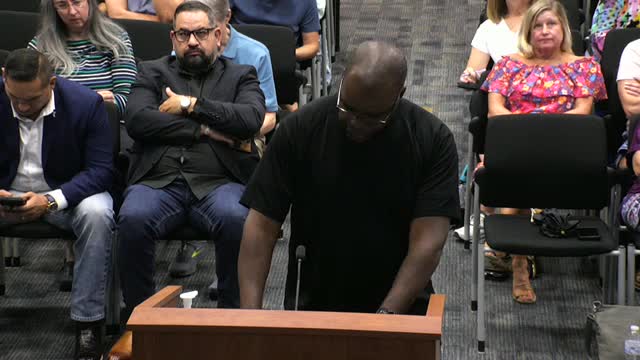Heated Debate Erupts Over School Library Book Policies
August 26, 2024 | KATY ISD, School Districts, Texas
This article was created by AI summarizing key points discussed. AI makes mistakes, so for full details and context, please refer to the video of the full meeting. Please report any errors so we can fix them. Report an error »

In a recent school board meeting, heated discussions centered around proposed changes to library book policies, particularly regarding materials related to gender identity and sexual orientation. The meeting featured a stark divide between community members advocating for the inclusion of diverse perspectives and those calling for the removal of what they termed \"gender confusing\" content.
One speaker, expressing strong opposition to the inclusion of gender-related materials, argued that biological sex is immutable and criticized the focus on gender identity as a distraction from pressing issues such as inflation and job competition. This individual emphasized the need for educational resources to prioritize traditional subjects like math and science over what they described as \"mental illness\" related to gender fluidity.
Conversely, supporters of inclusive policies highlighted the importance of representation in literature for marginalized groups, particularly transgender and queer youth. A former student recounted personal experiences of discrimination following the implementation of policies perceived as anti-trans, urging the board to reconsider their stance on book bans. They argued that removing books that reflect diverse identities does not protect students but rather endangers them by denying their existence and experiences.
Another community member criticized the board for lacking expertise in childhood development when making decisions about what materials are appropriate for students. They accused board members of hypocrisy, claiming that while they profess to support parental rights, their actions undermine those rights by restricting access to diverse literature.
The meeting underscored the ongoing cultural clash over educational content in schools, with advocates on both sides passionately defending their positions. As the board considers revisions to library policies, the implications for student representation and educational inclusivity remain at the forefront of community concerns.
One speaker, expressing strong opposition to the inclusion of gender-related materials, argued that biological sex is immutable and criticized the focus on gender identity as a distraction from pressing issues such as inflation and job competition. This individual emphasized the need for educational resources to prioritize traditional subjects like math and science over what they described as \"mental illness\" related to gender fluidity.
Conversely, supporters of inclusive policies highlighted the importance of representation in literature for marginalized groups, particularly transgender and queer youth. A former student recounted personal experiences of discrimination following the implementation of policies perceived as anti-trans, urging the board to reconsider their stance on book bans. They argued that removing books that reflect diverse identities does not protect students but rather endangers them by denying their existence and experiences.
Another community member criticized the board for lacking expertise in childhood development when making decisions about what materials are appropriate for students. They accused board members of hypocrisy, claiming that while they profess to support parental rights, their actions undermine those rights by restricting access to diverse literature.
The meeting underscored the ongoing cultural clash over educational content in schools, with advocates on both sides passionately defending their positions. As the board considers revisions to library policies, the implications for student representation and educational inclusivity remain at the forefront of community concerns.
View full meeting
This article is based on a recent meeting—watch the full video and explore the complete transcript for deeper insights into the discussion.
View full meeting
